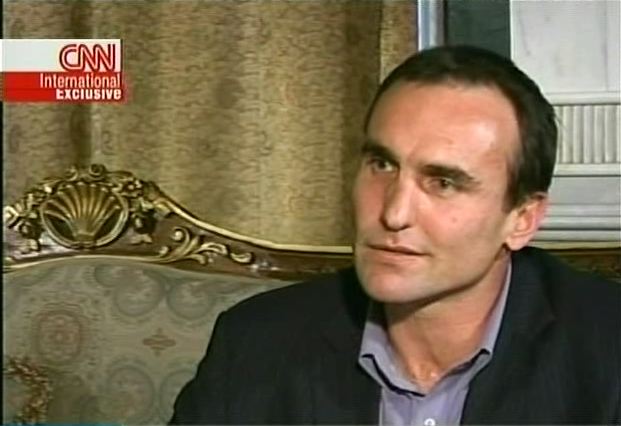YWT: More from the interview with Maliki

Click photo to play
Length: 4:35
HALA GORANI: Welcome back to CNN International and YOUR WORLD TODAY.
JIM CLANCY: That's right. This is where we bring CNN's international and U.S. viewers up to speed on some of the most important international stories of the day.
Well, the growing tensions between Iran and the United States worrisome to Iraq's prime minister, Nuri al-Maliki.
GORANI: He says he's concerned the tensions could evolve into a proxy war inside of Iraq itself. In an interview with CNN, al-Maliki laid out his concerns and talked about what it's going to take to bring security back to his country.
(BEGIN VIDEOTAPE)
MICHAEL WARE, CNN CORRESPONDENT: What is the nature of Iranian activity in Iraq today?
NURI AL-MALIKI, IRAQI PRIME MINISTER (through translator): All the regional countries want to interfere in Iraq: Iran, Turkey, Arabic countries like Jordan and Saudi. And each one of them has his own reason to interfere in Iraq.
Some of them come from the position of facing America in Iraq. For some of them it's about the sectarian confrontation in Iraq. And for others, from the position of political confrontation in Iraq.
Interference exists in Iraq. And we have talked about it frankly and clearly, whether it was by trafficking weapons or supporting specific sides. And when our delegations go to those countries, their message is: Stop your interference in Iraq, because we will not allow you, no matter how good our relations are.
For example, Iran is Shiite and we are Shiite. And we have many Shiites in Iraq. But this does not justify Iran interfering in Iraq. We respect this relationship. We will not allow such interference to exist.
Also, Iraq is an Arab country. The majority are Arabs. But this also will not justify for Arab countries to interfere in Iraq.
WARE: Is American intelligence wrong when it says Iran is working to kill American soldiers in your country?
AL-MALIKI (through translator): I didn't say it does not exist. And the Americans, when they say that their intelligence is saying that Iranians are killing their soldiers, it means their intelligence is based on information that they got. And this is not an obscure thing.
There is a struggle between Iran and America. And we have told the Iranians and the Americans, we know that you have a problem with each other, but we're asking you, please, solve your problems outside of Iraq.
We do not want the American forces to take Iraq as a field to attack Iran or Syria, and we will not accept Iran to use Iraq to attack the American forces. But does this not exist? It exists, and I assure you it exists.
But it is based on the struggle between the two countries. And from our side, we're trying to stop the effort to have a struggle in Iraq.
We're always encouraging the two sides to negotiate and to try to find an agreement away from Iraq. Iran and America, we are ready to pay efforts to solve the problems between them if it is possible. But not on the account on Iraq.
Iraq has nothing to do with the American-Iranian struggle. And we will not let Iran play a role against the American army. And we will not allow America to play a role against the Iranian army. And everyone should respect the sovereignty of Iraq.
(END VIDEOTAPE)
CLANCY: Now, correspondent Michael Ware, of course, who sat down with the prime minister in that interview, joins us now live to talk a little bit more about it.
Michael, what is the nature of the prime minister's relationship now with the United States?
WARE: Well, clearly, the prime minister of Iraq and the U.S. mission here on the ground have thrown their lot in together. He firmly believes that the current plan to secure Baghdad with a surge of 21,000-plus American soldiers will work.
Nonetheless, he leaves the door open for an escalation, an increase in U.S. troops. Nonetheless, there's evidently friction in the relationship.
He made it very clear to us that he believes America has made a number of strategic blunders. He seems that he feels he's been forced to run a race with a horse that's been nobbled.
He says that terrorism in this country has grown because of the strategic errors that America made in the past in building the security forces that he now has. He also vowed that his forces could take over security in this country within three to six months, but it will need increased support, principally financial and arming, by America.
So, obviously, this is somewhat of a prickly, difficult relationship that's under great strain -- Jim.
CLANCY: All right. Michael Ware reporting to us there live from Baghdad.
